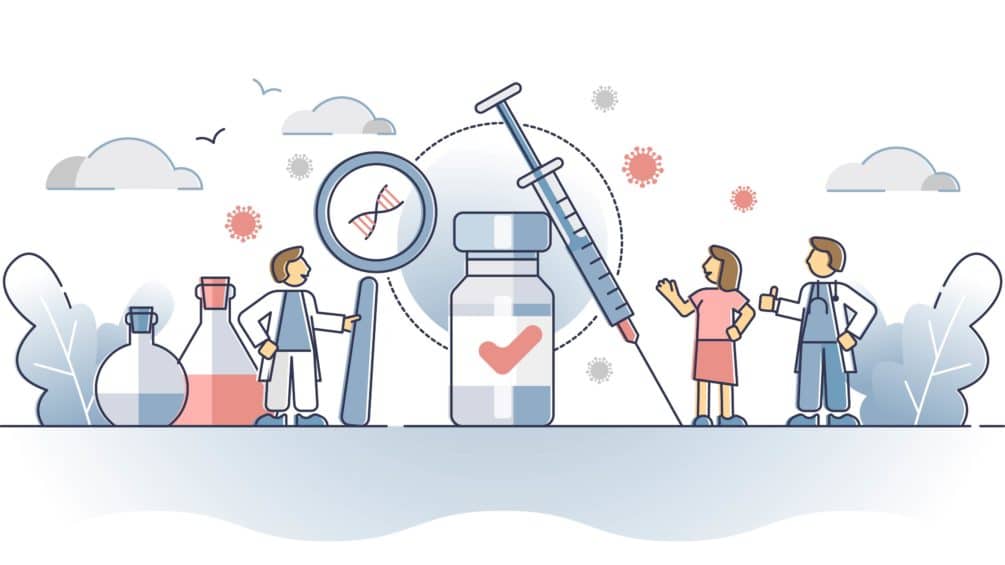How to Create an Effective COVID-19 Vaccine Communication Strategy for Your Patients

COVID-19 vaccine hesitancy remains an ongoing challenge to our nation’s public health efforts. According to a just-published KFF survey, 31% of Americans report they will take a “wait and see” approach to vaccination, 7% say they will accept a vaccine only if required, and 13% state they will refuse a vaccine altogether.
Misinformation is taking its toll. The NY Times recently reported that we’re officially underselling the vaccine. That vaccine hesitancy, combined with large percentages of the population still eschewing basic safety measures, such as handwashing and mask-wearing, clearly hinder our nation’s COVID-19 pandemic recovery.
Meanwhile, the other half of the population wants the COVID-19 vaccine, and many of them want it now. Hospitals, urgent cares, and other healthcare practices tell us they are experiencing high volumes of phone calls and online inquiries about the vaccines, seeking guidance about benefits, risks, and vaccine locations.
All these factors create a golden opportunity for healthcare providers to serve their patients with the right communication strategy. It’s also a great time to build their brands, educate their communities, grow thought leadership and support the common good.
Doctors and Hospitals are Uniquely Positioned to Help
In a recent survey, 88% of Americans trust their doctors and nurses for advice and information about COVID-19 vaccinations. Coming in at a close second is experts at federal, state, and local health agencies (87%), their pharmacist (82%) and friends and family (78%).
In another survey conducted by Klein & Partners, Americans’ Reactions to the COVID-19 Vaccine(s), they found that primary care physicians are the most trusted and valuable source of information for the vaccines.
The takeaway for healthcare brands: Make sure your medical organization has a clear consistent message about the vaccine as part of its patient communication strategy.
In a previous post, we shared some of the marketing adjustments you should be making in response to the pandemic. If you haven’t already, we encourage you to read that post and then follow up with this one to develop a written plan on the coronavirus.
What is a communication plan for patients?
When it comes to the health and wellness industry, a communication plan allows you to deliver important health information to your patients.
A proper plan about the COVID-19 vaccine communicates what people need to know about these new vaccines. It should be easy to understand and simple to access for current patients, new patients, and other appropriate stakeholders.
How to Develop Your COVID-19 Communication Strategy
To create an effective COVID-19 communication plan, you’ll need to define who you’re targeting, what you want to say, where you want to distribute it, and how you will keep the information updated regularly.
Here’s how to approach each step:
Identify with your audience: During a time of misinformation campaigns and distrust in the government, it’s important to stay empathetic and provide reliable information along with links to other reliable sources.
Remember that people virtually always adopt new technologies at varying speeds -- from DVDs to video streaming to smartphones and now COVID vaccines. The Diffusion of Innovations theory classically segments the population into innovators, early adopters, early majority, late majority, and laggards.
Also, as mentioned in a previous podcast, many people remain in various stages of grief when it comes to the pandemic as well as the vaccination process. Understanding their emotional state will help you craft a message that resonates with them and keeps them on track with their health goals.
Craft your message: In this case, you already know the topic. But what is the information or message you want to convey? This depends on the type of health care facility you are. In general, doctors, urgent cares, hospitals, and other healthcare providers should craft a message with the following information:
- What are the COVID-19 vaccines?
- How do they work?
- Why patients should get vaccinated
- Effectiveness of the vaccines
- Who should be vaccinated
- Additional FAQs on vaccines
- How to prevent the coronavirus
- How to slow the spread of COVID-19
If you plan on offering the vaccine, make sure to include specific information about when the vaccine will be available and whether you will send messages about eligibility for appointments.
Select your channels of delivery: There are many ways to communicate your vaccination plan to your medical practice patients. Some ways include your website, social media channels, patient portals, text, email, outbound phone messaging, inbound phone message recordings, and in-person brochures.
Keep the information updated: Whether you have an in-house or agency marketing team, you’ll need access to the marketing professionals in charge of updating your communication plan. Make sure you have them on hand for adding information, making tweaks, or adding resources.
Seven Marketing Communication Strategies to Educate Your Patients About COVID-19 Vaccines
It’s been busy for us at Healthcare Success. I asked our Senior Account Manager Leslie Hines-Brooks to share some of the real-world strategies we’ve implemented for our clients.
Here are seven proven routes you can explore and employ:
Website Updates
By now, most of our clients already have a single web page dedicated to COVID-19 information. Some even have hubs with multiple pages of information. If you don’t yet, this is the best place to start. Using your existing COVID-19 page, you can add information about vaccination, or add a link to a newly created web all about vaccines.
This page will be the ultimate source of information for your healthcare patients and where you can regularly update your marketing communication plan. It can also be the landing page to point to for future blog posts and social media announcements about vaccinations.
Email Message to Patients
A simple but effective way to communicate with your patients is with one or more well-crafted email messages about the vaccines. Be sure to link to your blog, website, or another authoritative source for more information about vaccines. As always, avoid sharing information or using platforms that could violate HIPAA requirements.
Text Messages
Text messaging patients is becoming more popular, especially for the younger generation. With their opt-in permission, you can send a mass text to your patients through a third-party platform with your messaging or provide a link to your website so they can read more.
Patient Portal Messaging
The patient portal is a great resource for patients, and an effective spot to add your message for the vaccine. Depending on the platform you use, you can add a banner, dedicate a page in the portal, or provide a link to your website.
Automated Prerecorded Calls to Patients
One of our clients is a health care center with multiple locations. For them, it made sense to prerecord a special message on vaccinations and call their patient base. Using an automated calling system, you can reach a large, targeted group of people with a specific message you want to convey. With this approach, you can also guide the patient to visit your website.
Updating Hold Messages
Another effective communication delivery channel is the recording hold message. You can easily prerecord a special message about vaccines or allow them to select a number to hear more about vaccines.
Organic Social Media
Of course, remember to update your social media platforms like Facebook and Instagram, with links back to content on your website.
During times like these, communicating the right information to patients in a way that shows you care about them matters.
Of course, if your larger mission includes educating the community, you can also reach outside your patient base and promote vaccine education through traditional advertising, online advertising, and publicity.
Related Articles:
How Doctors and Hospitals Can Help Defeat COVID-19 Vaccine Resistance and Misinformation
COVID-19: Healthcare Marketing Adjustments To Make in Response to Coronavirus
Close Encounters of the Media Kind
Three Ways To Use Technology to Improve Trust and Communication









